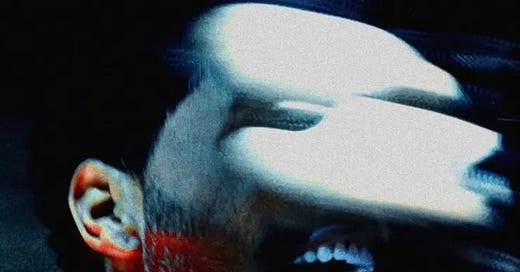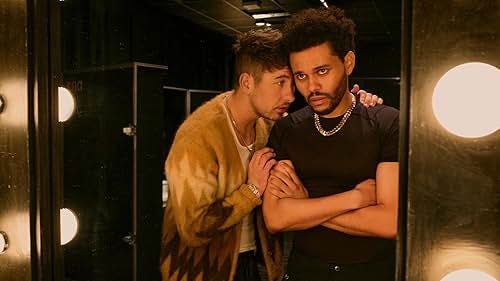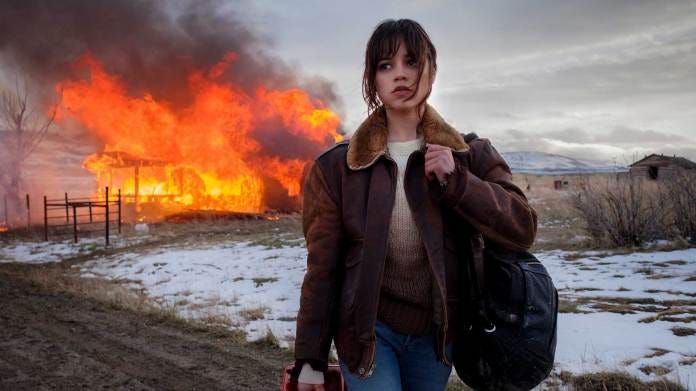You were probably expecting me to review something really big this week. Maybe you wanted me to lavish praise on the final Mission Impossible film, maybe you wanted me to slate the live action Lilo and Stitch, or maybe you wanted me to get all giddy over The Phoenician Scheme — the latest box of treats from Wes Anderson. Instead, I am talking about Hurry Up Tomorrow, one of the worst reviewed films of the year, and I am hoping to make you change your mind on it.
If you've heard of Hurry Up Tomorrow, you've heard of it for one of three reasons. The first reason would be that you're a fan of the director Trey Edward Shults, whose last two films (It Comes at Night and Waves) were divisive cinematic treats that I hold dear. Second, maybe you're a fan of The Weeknd, whose musical career has gone from strength to strength as his acting career has... well, has gone from Uncut Gems to The Idol. Third reason, and probably the biggest, you've seen the reviews. I would not recommend Rotten Tomatoes as a yardstick for film quality, but if you do subscribe to those sorts of ideas, the film is rated lower than anything else currently in cinemas, at 16%. If I'm honest, I'm baffled by that. Hurry Up is certainly a film I expected to be divisive, but 16% feels plain incorrect. Art is subjective, blah blah blah, but did everyone watch the same film I did?
The plot is, to be fair, not exactly complex. We follow Abel, as a fictionalised version of The Weeknd (played by Abel Tesfaye, a real version of The Weeknd), while he begins to lose himself on tour. He is having problems with his voice and his manager (a skeezy Barry Keoghan) is interested only in money and drugs, all the while Abel is caught up thinking about his ex-girlfriend who he did wrong. At the same time, we follow a mysterious woman (Jenna Ortega, whose agent is randomly picking her roles with shotgun precision), a character wrapped in mystery, containing many mysteries. She’s quite mysterious. Our first glimpse of her is while she is burning down a house, and it becomes apparent shortly after that she is set on a collision course with Abel.
What follows is hardly a ground-breaking narrative. Even in the domain of nocturnal odyssey films (think Good Time or After Hours), the plot is low-key and you know exactly which films are inspiring particular narrative beats. What we get by the end is quite metaphorical and quite interpretive, which may be the first issue people have with it. Without a traditional narrative to follow from start to finish, lots of viewers may struggle to engage at all with the events on screen, and may never engage with the film on a deeper level. I don't mean this to sound like a superiority thing, but I don't think everyone is expecting a film that strays from the path of the typical narrative and veers this excitingly into the interpretive.
One criticism I have seen of the film is the performances. People still hate Tesfaye's acting from his work on The Idol and I think it's colouring how his performance is being seen. As will be a theme through this review, I'm not going to try and tell you that Tesfaye is a secret genius and is giving the best performance of the year. He's not, he is not even one of the two best performances in this film that has three performances. However, he is compelling as a pathetic popstar who is losing focus on his place in the world. The Weeknd looks like a loser in this film, a loser you believe in because he's so pathetic. That doesn't work without Tesfaye at least putting in decent work and we overestimate how hard it is to play yourself.
He acts opposite Jenna Ortega who... who I now realise I’m ambivalent on. I've seen her in quite a few things now but she's never stood out to me, positively or negatively. She's never made a project worse by being in it, but she is never the best thing in a film. That's the case again here; she performs well and is mainly a compellingly blank slate for the cinematography and score to create meaning with, which I am so excited to get to, in just a minute, hold on for me.
I also want to briefly chat Barry Keoghan, who gives my favourite performance in Hurry Up. He plays Abel's manager and friend, doing a compelling job at being absolutely terrible at both. We all know Keoghan can play rancid little freaks and the streak continues here, big thumbs up from me, good on ya lad.
Alright, let me really lavish some praise on this before I have to admit this isn't perfect and I can't be an unstoppable contrarian. The cinematography in Hurry Up Tomorrow is absolutely awesome. The film expands on the previous style for Shults' films, particularly Waves, though this time with a new director of photography in Chayse Irvin (Shults' regular DP Drew Daniels was working on Anora, so don't worry, he's doing fine). Irvin has one of the most fascinating filmographies I've seen in a while. In the last decade alone, he has worked on BlacKkKlansman, Lemonade and Blonde. A well respected crime caper, a genre shaping visual album and a biopic that is widely hated. What do we do with that? Blonde is such an interesting footnote here too, a polarising film yet one that has a distinctive and powerful visual language, for better and for worse. I'm getting a little side-tracked but my point is: it's really interesting that Irvin seems to be building a reputation as being a great cinematographer in films that people detest.
I guess Hurry Up is on that list. The swirling and spinning camera is an expansion on Waves, in which the camera would often be plonked in the middle of a scene and just spin around, catching all the characters doing their thing. There's lots of that here; shots are super fluid and we're launched around the set through them, never getting a sense of sure footing. For some, I can see how this is annoying and bad. These people are either cowards, suffer from motion sickness, or just don't get what we're doing here — only one of these things is a valid excuse. Surely if you're watching the film as a Shults fan, this is him pushing his cinematography in new and exciting ways? How am I the only one seeing that?
What did you all think this was going to be? To me, this feels like a Trey Edward Shults film. I am a fan of his work and I felt satisfied with the way that he and his collaborators are in conversation with the work they've done before, expanding upon and commenting on it. Am I the crazy one for spotting that?
The score is bonkers stuff too. Daniel Lopatin (in collaboration with Tesfaye) is here on business after demolishing both my ears and heart with his work on Good Time and Uncut Gems. The latter is an important touchstone, as many have noted, because it stars Tesfaye playing a fictionalised version of himself in full The Weeknd "weird hair, don't care" era. Since then, Tesfaye and Lopatin have worked together on a few The Weeknd albums, starting with After Hours, which came out only a few months after Uncut Gems. They've got a good working relationship; I like these last three albums and I'm glad they get to keep doing their thing together. Lopatin knows what he's doing with the score here, and is it evocative of his work with the Safdie brothers? Sure. But it also works as a standalone thing and I dug it.
One really interesting thing about the score though is that it's also the new album from The Weeknd. We enter a curious ouroboros situation here where it's not clear where the album starts and the film ends. Versions of songs without vocals appear as the score and the live performances are of songs from the new album, with none of the biggest The Weeknd songs appearing until a very specific moment. More on that later. Personally? Love that. I listened to the album before seeing the film and the two fit together snugly, these bleak little nocturnal odysseys that spin out into different places. Which all leads me to ask: what did you all think this was going to be? To me, this feels like a Trey Edward Shults film. I am a fan of his work and I felt satisfied with the way that he and his collaborators are in conversation with the work they've done before, expanding upon and commenting on it. Am I the crazy one for spotting that?
To be fair, to be rational, to be less of a Gogo's Crazy Bones about this, I'm not going to argue that the film is some perfect masterpiece. It is flawed in some big ways. The third act goes quite abstract and while I always enjoy when a plot becomes abstract, I need something emotional to latch onto. I was doing a lot of thinking during the third act but I wish I was doing more feeling. It's a big old metaphor of a film and that's cool, but that doesn't mean it can't be something else at the same time. It also pales in comparison to other thematically and narratively similar films. If you want to see an artist playing themselves and playing their music in a world of fiction, it doesn't reach the heights of True Stories. If you want to see an examination of how the world chews up its music icons, and how they might eventually come to deserve it, Vox Lux remains a singular piece of art. If you just want to see The Weeknd suffer, we will always have Uncut Gems. There's all of that... And then there's also the scene. A scene that has required me to lazily use an ellipsis for a third time like some hack fraud writer. This next bit will go into spoilers, so skip the next section if you want to remain unspoiled.
Spoilers lie below, so tread carefully. But if you're still here, let me tell you about the scene. In the third act of the film, Jenna Ortega's character has kidnapped The Weeknd and has tied him up on a bed. What does she do with him in this moment? Naturally, she monologues to him, American Psycho style, about how much she loves his songs. Cue extended dance scenes and explanations of the songs "Blinding Lights" and "Gasoline" as a gagged and bound Abel stares on in a divine cocktail of fear, confusion and awe. As I watched this scene in the cinema, I felt like I was levitating. This is an unbelievably crazy swing and I was so happy to follow the film at this moment. If you're already not on board, I see how you could be repelled, but I was only drawn further in. I was reminded of a scene from Under the Silver Lake (another polarising film from a cult A24 director) in which Andrew Garfield's character meets an old man who claims to have written all the biggest songs of the past five decades. You're so busy being baffled at what the film is doing that you allow the music to wash over you and do the magic. They're really big scenes that take really big swings and really dictate how the rest of the film works for you.
I am left feeling that we have become too cynical as a people. I understand that we enjoyed making fun of everyone involved with The Idol. I rewatch videos talking about it regularly too; I'm only human (Mic the Snare's video is obviously the cream of the crop.) But Lily-Rose Depp got to earn her indie cred in Nosferatu, Troye Sivan's new album was widely celebrated, and Da'Vine Joy Randolph won an Oscar. All three are great performers, they deserve it, but if we're ready to forgive those involved in The Idol, does Abel Tesfaye not deserve to be included in that? If we just need to have a man to blame for The Idol, Sam Levinson is right there, trying to scurry back to make more Euphoria. Condemning this film because he's in it means people go into this film loaded with irony, ready to hate the interesting risks the film takes.
Are you seriously telling me we should be dunking on a film like this when the live action Lilo and Stitch is out? This is where our ire is going? Grow up man, sick of it. Go to the movies, take a risk, dare to open your heart to something new. Or, if you really want, let our corporate overlords take over and never have to dare to feel something interesting again. Your choice. Hurry Up Tomorrow is this unique feature that somehow made it to the multiplex and our mockery of it means we'll be unlikely to see similar again. Banger movie, Henry out, fix your hearts or die.






